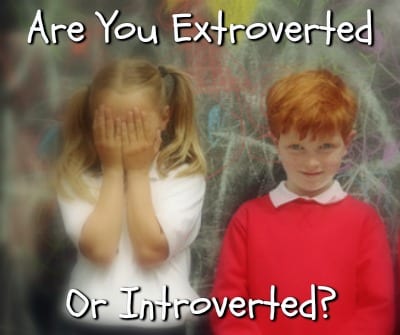 Mikayla was standing in the crowd at a concert for one of her favorite bands. Her friend is standing next to her, swaying along to a guitar riff and smiling. Her friend is having a blast. Though Mikayla had fun for a while, she is now ready to head home and find solitude in her bed. She loves this band but the loud music and huge crowd of people have left her feeling completely drained while her friend seems recharged and ready for an encore.
Mikayla was standing in the crowd at a concert for one of her favorite bands. Her friend is standing next to her, swaying along to a guitar riff and smiling. Her friend is having a blast. Though Mikayla had fun for a while, she is now ready to head home and find solitude in her bed. She loves this band but the loud music and huge crowd of people have left her feeling completely drained while her friend seems recharged and ready for an encore.
Many people have heard of the terms introvert and extrovert. You may even think you know the difference between these two terms. Introverts tend to be quiet and reserved while extroverts are talkative and outgoing. But that is just the beginning of what makes extroverts and introverts tick. There is much more to know such as how they recharge, where their energy comes from, and the best way to interact with them.
 Extroversion and Introversion are terms first used by a psychologist named Carl Jung who explained the different attitudes people use to direct their energy. This does not mean you are either one or the other one hundred percent of the time. Everyone spends some time as an extrovert and some time as an introvert. The questions is, which one are you most of the time?
Extroversion and Introversion are terms first used by a psychologist named Carl Jung who explained the different attitudes people use to direct their energy. This does not mean you are either one or the other one hundred percent of the time. Everyone spends some time as an extrovert and some time as an introvert. The questions is, which one are you most of the time?
Extraversion (E)
People who are considered extraverts are not as sensitive to outer stimuli. They get their energy from active involvement in events and having a lot of different activities on their calendars. They feel more energized around other people. They like moving into action and making things happen. They tend to talk their problems out loud to better understand them and hear what others have to say. Extraverts tend to be much more proactive in experiencing the world around them.
Extroverts tend to be the following:
- They are outgoing.
- They are comfortable working and socializing in groups.
- They have a wide range of friends and know lots of people.
- They enjoy pushing limits and challenging both themselves and those around them.
- They tend to jump into an activity quickly and don’t allow enough time to think it over.
- They are more willing to take the lead in many situations.
Introversion (I)
Introverts like getting their energy from their inner world and solitude. They are more sensitive and need to escape outer stimuli in order to be more functional. They often prefer doing things alone or with one or two people that they feel comfortable with. They take time to reflect so that they know what they are doing when they do decide to act. They are the type of people that can dine at a restaurant alone or read a book for hours by themselves.
Introverts tend to be the following:
- They are seen as reflective or reserved.
- They may be sensitive to noise or bright colors.
- They feel comfortable being alone and doing things on their own.
- They have a small group of people they know well.
- They tend to spend a lot of time reflecting.
- They may strongly prefer minimalism in their environment.
- They may communicate better in writing than in person.
The Dopamine Difference
A major difference between the brains of introverts and extroverts is the way they respond to a chemical in the brain called dopamine. When there is excess dopamine in the brain, we become more talkative, alert to our surroundings, and motivated to take risks and explore the environment. Introverts don’t have less dopamine present in their brains than extroverts do. Both have the same amount of dopamine available. The difference is in the activity of where the dopamine gives pleasure. It is more active in the brains of extroverts than in the brains of introverts. Extroverts become more energized when a dopamine reward is present. They buzz with an enthusiastic rush of good feelings. Introverts, on the other hand, feel overstimulated by the same dopamine reward.
In the example above, the noise of the crowd at the concert were simply all part of the fun for the extroverted friend. This stimulation intensity acted as a cue to that friend that she was achieving her dopamine reward of a fun night out. Yet, as the night wore on, Mikayla became annoyed, tired, and even felt punished by the night’s activities the more she became overstimulated.
Acetylcholine For Introverts
Introverts prefer to use a different chemical in the brain called acetylcholine. Both dopamine and acetylcholine are linked to pleasure; the difference is, acetylcholine powers our abilities to think deeply, reflect, and focus intensely on just one thing for a long period of time. It also helps explain why introverts like calm environments. It’s easier to turn inward when we’re not overstimulated by our external situation. When you lounge at home in quiet solitude, lost in a book or watching Netflix, you are experiencing the pleasant effects of acetylcholine.
Nervous System Differences
A final piece of the introvert-extrovert mystery has to do with the nervous system. Acetylcholine is linked to a specific side of the nervous system call the parasympathetic side. This side is nicknamed the “rest-and-digest” side. Using this side lets our bodies conserve energy and withdraw from the outer environment. It is the side that helps the muscles relax; where energy is stored; where food is metabolized; and slows our heart rate and blood pressure. Basically, our body gets ready for rest and introspection —two of the things introverts like the most.
Both introverts and extroverts use both sides of their nervous systems at different times, just like they use both dopamine and acetylcholine. Of course, extroverts usually favor the opposite side of the nervous system: the sympathetic side, known as the “full-throttle” system. This side makes us active, daring, and inquisitive so we can discover new things. The brain becomes alert and hyper-focused on its surroundings. We have more energy when using this side. This is also the side that prepares us to make snap decisions. Extroverts thrive on the good feelings that are created when they engage the sympathetic side. For introverts, this side can become too much.
Do introverts dislike people?
Most people who don’t understand introversion, might mistakenly think that introverts are antisocial and don’t like people. However, most of the time, an introvert has become overstimulated or used up all their energy in a social situation and wants to revert to solitude to recharge. Socializing takes more effort and can drain an introvert, unlike a social extrovert.
Extroversion and Introversion are one of the oldest notions in the history of personality theories. It has long been observed that some people are expressive, outgoing, and comfortable in interacting with their surroundings while others are reserved, quiet and more comfortable alone. Extroverts sincerely enjoy engaging with the external world. Introverts prefer to rely on their own inner world instead of seeking stimulation from the outside.
